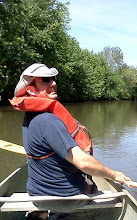 Every so often I am overcome with a deep sense of mourning for the loss of the magic of childhood. The mind and heart of a child see the places and spaces of the bleak adult lifescape in transformative ways. A rusted out car on blocks becomes a rocket ship or an oceanliner. Pots and pans become helmets and drums. A shed with busted out windows becomes a fortress. Cardboard boxes become fantastic machines or lemonade stands.
Every so often I am overcome with a deep sense of mourning for the loss of the magic of childhood. The mind and heart of a child see the places and spaces of the bleak adult lifescape in transformative ways. A rusted out car on blocks becomes a rocket ship or an oceanliner. Pots and pans become helmets and drums. A shed with busted out windows becomes a fortress. Cardboard boxes become fantastic machines or lemonade stands.Alice McLerran's Roxaboxen, a children's picture book which I stumbled across, is as much a story about the magic of childhood as it is a primer for adults on how to reclaim it.
 "Marian called it Roxaboxen. (She always knew the name of everything.) There across the road, it looked like any rocky hill--nothing but sand and rocks, some old wooden boxes, cactus and greasewood and thorny ocotillo--but it was a special place."
"Marian called it Roxaboxen. (She always knew the name of everything.) There across the road, it looked like any rocky hill--nothing but sand and rocks, some old wooden boxes, cactus and greasewood and thorny ocotillo--but it was a special place."The story revolves around Marian, the child leader of the imaginative community of Roxaboxen. Marian rallies her sisters and the neighborhood children and sets about creating streets and houses outlined with white stones and furnished with old wooden boxes and an economy supported by round black pebbles. Marian was the mayor, "of course; that's just the way she was. Nobody minded." Laws were created to regulate "traffic". If you had a round thing to use for a steering wheel you had a car, but speeding would land you in jail amidst uncomfortable cacti. There were no speed limits for horses. Boys-against-girls skirmishes ensued. The dead were buried: one lizard, honored yearly with cactus blooms. Though the seasons changed and the years passed, "Roxaboxen was always waiting. Roxaboxen was always there."

"Not one of them ever forgot. Years later, Marian's children listened to stories of that place and fell asleep dreaming dreams of Roxaboxen. Gray-haired Charles picked up a black pebble on the beach and stood holding it, remembering Roxaboxen."
Now the magic of the story truly came alive for me in the afterword, wherein you learn that Marian was the author's mother and that Roxaboxen can be found: "On a hill on the southeast corner of Second Avenue and Eight Street, in Yuma, Arizona..." With help from a manuscript written by her mother during her childhood, the memories of relatives and maps and letters from former Roxaboxenites McLerran recreates for the reader the world of Roxaboxen "as if she'd played there herself."
Jesus, in the Gospel of Matthew, often used metaphors for describing the Kingdom of Heaven; like a mustard seed, yeast, a hidden treasure, a pearl found by a merchant, and so on. It occurred to me while reading Roxaboxen that an apt metaphor may be: "The Kingdom of Heaven is like an ordinary rocky hill with sand, rocks, and boxes but viewed through the eyes of a child." The childlikeness that Jesus calls for in other Gospel passages is a way of seeing the world as God sees it; not bleak and ordinary, but extraordinary and full of wonder.
Your children already know the lessons found in Roxaboxen, so buy this book for yourself as a parent. As I said before, it is a perfect primer for adults on how to reclaim magic of childhood.
Mark 10:13-16 (NRSV): "People were bringing little children to him in order that he might touch them; and the disciples spoke sternly to them. But when Jesus saw this, he was indignant and said to them, "Let the little children come to me; do not stop them; for it is to such as these that the kingdom of God belongs. Truly I tell you, whoever does not receive the kingdom of God as a little child will never enter it." And he took them up in his arms, laid his hands on them, and blessed them.



